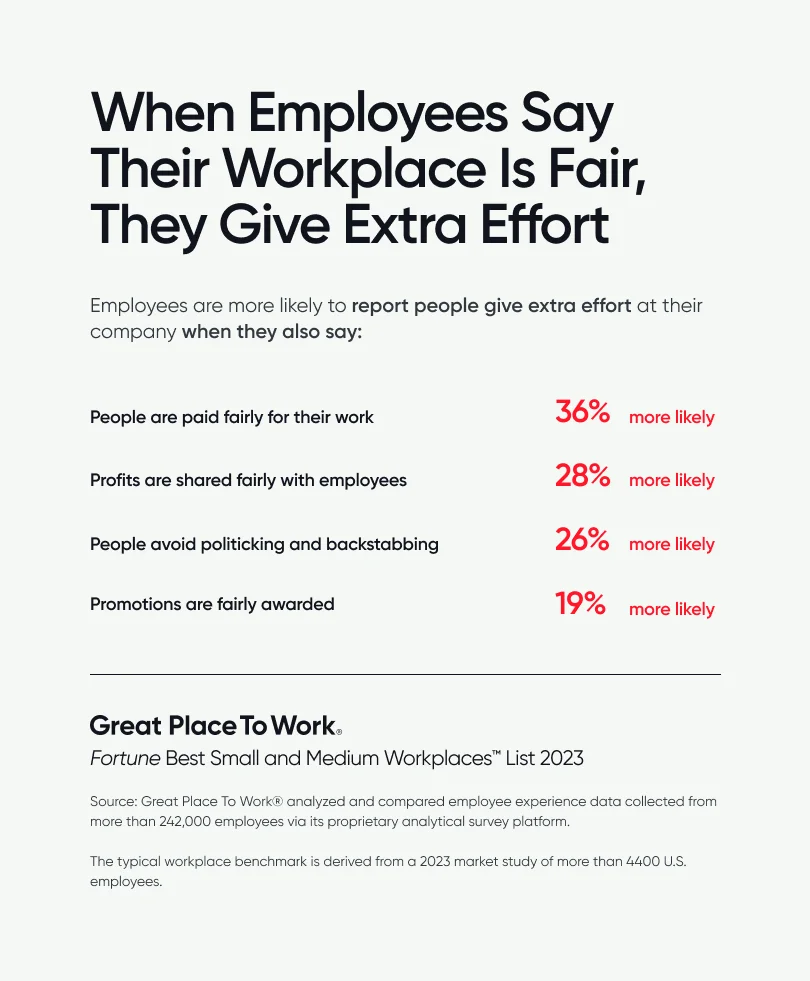How Fair is This Company to Employees?
In today’s corporate world, the fairness of a company to its employees is a crucial factor in shaping both the company culture and overall productivity. Fairness impacts employee morale, retention, and job satisfaction. But how can you determine if your company is truly fair to its employees? In this article, we will explore key aspects of workplace fairness and how they can shape an organization’s success.
The Importance of Fairness in the Workplace
Fairness is not just a buzzword—it’s a fundamental pillar of a successful business. When employees feel that their workplace is fair, they are more likely to go the extra mile, show commitment, and stay with the company longer. This is because fairness fosters trust and a sense of belonging. For example, when management implements transparent policies for promotions, pay raises, and job responsibilities, employees can clearly understand how decisions are made, which improves their overall job satisfaction.
Fairness can manifest in various ways, such as equal opportunities for growth, transparent communication, and fair compensation. It’s essential for businesses to recognize that promoting fairness not only boosts employee morale but also enhances productivity and reduces turnover.

Equal Opportunities for All
One of the most prominent indicators of fairness in a company is the equal opportunity offered to all employees, regardless of their background, gender, or ethnicity. When employees feel that they are given the same opportunities to succeed and advance, they are more motivated and engaged.
- Promotions and Career Development: A fair company provides clear and consistent pathways for promotions. Employees should be judged based on their performance and qualifications, not on personal biases.
- Training and Skill Development: Offering equal access to training programs and skill development is another critical factor. Employees who are given the tools to grow will feel valued, which in turn can lead to higher retention rates.
For example, companies like DUYTHIN.DIGITAL ensure that all employees have access to automation tools for improving their skills, such as automation for social media platforms like Facebook, Zalo, and Telegram, or using Google SEO tools for career development.
Transparent Compensation and Benefits
Fairness is also evident when employees are compensated fairly for their work. Transparency in pay structures and benefits packages is crucial to creating an environment of trust. Employees should have a clear understanding of how their salary is determined, and there should be no ambiguity around bonuses or raises.
- Salary Transparency: Fair companies are open about their salary structure, ensuring employees are paid competitively for their skills and experience.
- Employee Benefits: Benefits such as healthcare, paid time off, and retirement plans should be provided equally to all employees, without discrimination.
It’s important that employees feel they are receiving compensation and benefits that reflect their contributions and efforts.
Fair Treatment and Workplace Culture
Fair treatment goes beyond pay and promotions. It also relates to the day-to-day experience of employees in the workplace. A company that treats its employees fairly fosters a culture of respect, inclusivity, and collaboration.
- Respectful Communication: A culture where open and honest communication is encouraged promotes fairness. Employees should feel they can voice concerns without fear of retaliation.
- Inclusivity: Fair companies take proactive steps to promote diversity and inclusivity in the workplace. This creates an environment where all employees feel safe and valued.

Addressing Bias and Discrimination
Workplace fairness involves actively addressing and combating bias and discrimination in all forms. Whether it’s based on gender, race, age, or sexual orientation, discrimination has no place in a fair workplace.
- Anti-Discrimination Policies: Fair companies have policies in place to address discrimination and ensure that all employees are treated with dignity and respect.
- Diversity Training: Many organizations offer diversity and inclusion training to help employees better understand unconscious biases and promote a more inclusive work environment.
Leadership and Fairness
The leadership team plays a critical role in establishing and maintaining fairness in the workplace. Fair leadership is characterized by integrity, transparency, and accountability. Leaders should model the behaviors they wish to see in their teams.
- Consistent Decision-Making: Leaders should apply policies and procedures consistently across all levels of the organization, without favoritism or bias.
- Employee Feedback: Leaders should be open to feedback from employees, using it to improve the company’s fairness and work culture.
When employees believe that leadership is fair, they are more likely to feel motivated and supported in their roles.

Employee Recognition and Reward Systems
An important aspect of workplace fairness is having a clear and fair system for recognizing and rewarding employees for their hard work. This includes everything from recognition for a job well done to performance-based bonuses.
- Reward Systems: Fair companies offer rewards that are based on performance and contribution, not favoritism. A well-structured recognition program can increase employee engagement and satisfaction.
- Celebrating Achievements: Regularly celebrating employees’ achievements boosts morale and encourages a positive work environment.
The Role of Feedback in Promoting Fairness
Another way to promote fairness in the workplace is by encouraging employee feedback. By soliciting input from employees regularly, companies can gain valuable insights into areas where they may not be treating their employees as fairly as they think.
- Surveys and Polls: Implementing regular employee surveys and polls allows employees to voice their opinions about the fairness of the company. These tools can help identify areas where improvement is needed.
- Open Door Policies: Leaders who maintain an open door policy for employees to share concerns or feedback are seen as more approachable and committed to fairness.
Fairness in Work-Life Balance
Fairness is not only about how employees are treated during work hours but also about how a company supports their personal lives. Ensuring that employees have the ability to maintain a healthy work-life balance is a key factor in fairness.
- Flexible Hours: Companies that offer flexible work hours or remote working options show fairness by respecting their employees’ personal time.
- Paid Time Off: Fair organizations also provide generous paid time off, recognizing that employees need time to recharge.
FAQs About Workplace Fairness
Q: What are the benefits of having a fair workplace?
A: A fair workplace leads to higher employee satisfaction, better retention rates, and improved productivity. When employees feel valued and treated fairly, they are more likely to stay with the company long-term and perform at their best.
Q: How can I tell if my company is fair?
A: Look for indicators like transparency in pay and promotions, clear anti-discrimination policies, open communication, and a commitment to inclusivity. If these factors are present, it’s a sign that the company is striving for fairness.
Q: What can leaders do to promote fairness?
A: Leaders can promote fairness by being transparent, applying policies consistently, offering equal opportunities for advancement, and creating an inclusive environment where employees feel heard and respected.
Conclusion
Fairness in the workplace is more than just a feel-good factor—it’s essential for fostering a productive and engaged workforce. When companies prioritize fairness, they not only create a positive work environment but also build a foundation for long-term success. By ensuring equal opportunities, transparent communication, and a commitment to diversity and inclusion, businesses can create an environment where employees thrive.
Ultimately, fairness should be a core value for every company. When employees feel valued, respected, and supported, they are more likely to contribute their best work, leading to greater success for the company as a whole.